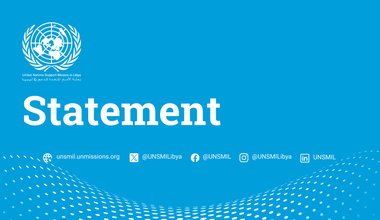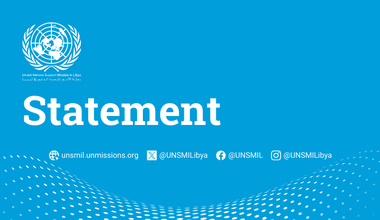Briefing by Mr. Tarek Mitri SRSG for Libya - Meeting of the Security Council 16 September 2013
Mr. President,
1. You have received the Report of the Secretary-General which provides information on the work of UNSMIL over the past six months and offers a sober reading of political and security developments in Libya during that period. A combination of internal and regional dynamics continues to place a huge strain on the political processes taking place in the country, which compounds further the difficult tasks facing the Libyan authorities, both the Government and the General National Congress, as they strive to ensure that the country’s transition moves peacefully forward.
2. During the last three months, we have seen more pronounced political disagreements among the various political forces. The main political blocs within the General National Congress decided, separately, to suspend their participation as organized political parties, in the work of national political institutions. Although partially reversed, these decisions were in large part a reaction to wide-spread popular discontent with political parties and reflected an accentuated polarization in public life.
3. There is also a regional dimension to the significant political changes in Libya. Recent developments, particularly in Egypt and Tunisia, have had a palpable effect on the political scene and greatly influenced the behaviour of some political forces. These events have injected a sense of unease into the political system as different political actors reassessed their positions regarding the major problems confronting Libya and the region more generally.
Mr. President,
4. The recent and severe disruption of the country’s oil exports, following protests at a number of terminals, mostly in the east, has grave consequences for Libya’s economic stability. The disruption has compelled Libya’s National Oil Company to take the unprecedented measure of declaring a force majeure, indicating its inability to meet contractual export obligations. Conflicts related to oil terminal protection and federalist demands in eastern Libya are at the core of the protests.
5. In a country where oil revenues account for approximately 80% of Libya’s gross national product and 97% of exports, the Libyan government faces the dangerous prospect of not being able to meet its financial obligations unless a resolution to this crisis is reached imminently. We believe that the resolution of this crisis, as well as of the many others confronting Libya, through peaceful means is vital to the country’s national interest and its ability to make meaningful progress in its transition. In this context, we also urge all parties to desist from the manipulation of Libya’s resources for political ends.
Mr. President,
6. With regard to the development of new legislation, the adoption of a law on transitional justice remains pending before the plenary of the General National Congress. UNSMIL believes that passage of such a law is vital to helping Libya deal with many of its past tragedies and crimes. It is equally essential in facilitating the difficult process of national reconciliation.
7. The situation of many of the estimated 8,000 conflict-related detainees remains problematic. While the Ministry of Justice has reported a reduction in complaints, reports of deaths in custody torture and other forms of ill-treatment continue to be a source of concern. However, UNSMIL has observed a marked improvement in conditions and treatment of detainees in centres that are effectively under the authority of the ministry of Justice and where there are experienced and trained judicial police officers.
8. There have been new developments regarding the trials of senior members of the Qadhafi regime. Further to the conviction and sentencing to death on 31 July of Ahmed Ibrahim, former Minister of Education and Information, the trials of some 35 defendants, including Saif al-Islam Qadhafi, are expected to commence soon.
9. In this regard, UNSMIL continues to underline the need for a coherent approach to secure acceptable standards in the prosecution of former regime officials, so as to avoid random charges and contribute to establishing a historical record of the crimes committed under the former regime. Ensuring fair trails for former regime officials will test the Libyan judicial institutions in the coming months. The prevailing security situation in the country and the continuing attacks on judges, lawyers and courthouses continue to present a formidable challenge to the authorities.
Mr. President,
10. In spite of the numerous difficulties and uncertainties, I am pleased to report that the Libyan constitution-making process has made some progress, with the adoption by the General National Congress of a law for the election of the Constitution Drafting Assembly.
11. UNSMIL had advocated for special measures for better representation of women in the constitution drafting assembly. However, the adopted electoral law provides limited representation for women, granting them six reserved seats in the sixty member assembly, lower than the 16% allotted to them in the July 2012 elections to the General National Congress.
12. For their part, cultural and ethnic minorities were granted six reserved seats. Some of their influential organisations and personalities are quite assertive in demanding that constitutional issues pertaining to their cultural and linguistic rights should be decided upon by consensus rather than by a two-thirds majority of the sixty member assembly, as stipulated in the Constitutional Declaration. The constitutional drafting process presents an opportunity for the Libyan people to forge a new social contract that will govern the new Libya, making imperative therefore that it be transparent, consultative and inclusive.
13. A new Board for the permanent High National Election Commission was recently selected. With the full support of the UN Electoral Team in the various areas of its work, the Commission is actively engaged in planning and preparing the elections to the Constitution Drafting Assembly.
Mr. President,
14. The security problems in Libya are still, arguably, the predominant concern for the Libyan people. Since my last briefing to the Council, there have been armed clashes in Tripoli between rival revolutionary brigades. Due to the limited state capacity to secure the capital, the newly elected President of the General National Council, Mr. Nouri Abu Sahmein assigned the task of protecting the city to the Libyan Revolutionaries’ Operation Room, a coalition of revolutionary brigades.
15. Tensions among various political, tribal and armed groups have also escalated into confrontations in various parts of the country resulting in several deaths. Assassinations of security figures, mostly in the east, and more recently of political activists and journalists, improvised explosive devices, attacks against members of the diplomatic community, threats against the UN and general criminality continue in the face of weak state security institutions. Border security is increasingly a critical issue that the authorities have yet to address efficiently.
16. Progress in integrating revolutionary fighters into the police and the Libyan army remains very limited, as is their reintegration into civilian life. In an attempt to encourage revolutionaries to enlist in the army, and to improve the salary scale for current uniformed personnel, the Government recently announced an increase in salaries for the military, effective from January 2014. The Government has also announced that it is moving forward with the training of twelve to fifteen thousand soldiers outside of Libya. Restructuring the army and addressing the inflated ranks of the officer corps, is an urgent priority. The Libyan police continue to integrate individuals from the armed brigades. Some are already enlisted and many more are in the vetting and enrolment process.
17. The Government’s preoccupation with the deteriorating security situation and the increasing divisions among political groups and revolutionary brigades have all inhibited the development of a solid, coordinated and effective national security system.
Mr. President,
18. When I last briefed the Council in June, I alluded to the enormous difficulties confronted in the aftermath of four decades of despotic rule. Next month marks the two-year anniversary since the fall of the authoritarian regime. It is more evident today that pre-conceived ideas about political transition are likely to be a recipe for disappointment, if not failure. Free and fair elections may have augured a democratic process but they raised more expectations than what the political institutions and forces have been capable of meeting.
19. Today, there is a sense of skepticism, and perhaps of rejection, with which the Libyan people view the political process. But this should not be mistaken for a loss of faith in national unity, democracy and the rule of law. Their commitment to the principles for which they fought their revolution remains deep. The Libyan experience has demonstrated the urgency of an inclusive dialogue and consensus-building on national priorities during the transition period as well as regarding guiding principles, norms of governance and basic rules of political action.
Mr. President,
20. In response to the increasing demand across the political spectrum, for a national dialogue that can address the country’s faltering transition, the Libyan authorities agreed on preparing and convening this dialogue. A national dialogue would provide a platform for engaging political, revolutionary, traditional and other actors in discussing urgent national issues and seeking consensus on strategies, as well as basic principles, that ought to govern political life in the transitional period until the adoption of a new constitution and the holding of new elections.
21. In my meetings with the leaderships of the General National Congress and the Government, I noted a shared belief that a national dialogue process would allow for the Libyan national interest to prevail over factional, regional and short-term interests. In light of the growing disillusionment with the political process, such a dialogue would give voice to many Libyans and opens a space that does not exclude any of those who may have contributions to make to public life and are otherwise isolated, separated or entrenched in their partisan attitudes. It would also promote a national capacity to address urgent priorities and ensure public support to the efforts of state-building, more particularly in the security and justice sectors.
22. There have been increasing calls for UNSMIL to play an active role in initiating and facilitating national dialogue. We will not shy away from shouldering our responsibility but will continue insisting that the process should be Libyan-convened and Libyan-led. I have assured the Libyan authorities, time and again, as well as many political leaders and opinion-makers of UNSMIL’s readiness and commitment to give advice and technical support to dialogue endeavors, whatever the form they may take. It is our hope that these efforts will come to fruition in the near future.
Thank you.
 United Nations Peacekeeping
United Nations Peacekeeping UN
UN









